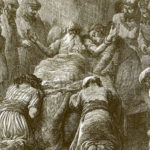I’m chairing our pastor-search committee, and we haven’t found many resources to help us. Can you suggest ethical guidelines for our committee to keep in mind?
You have assumed a significant responsibility. Most committee guidelines instruct you on the important tasks that must be performed—congregational survey, background checks and appropriate fact-finding questions. Rarely, however, do they direct you in the process of how to fulfill these functions. Undoubtedly, your ethics will go a long way in determining your outcome. Consider the following guidelines.
• Respect the theological truth of a call. Unquestionably, you will search for a “match,” a proper alignment of a prospective pastor’s skills with the church’s expectations. But your task is much deeper than that. As you invoke God’s direction, listen intently to understand the candidate’s personal calling, recognize how that calling has manifested itself over the years and understand why that calling may synchronize with your specific pastoral requirements.
• Be honest. No church situation is perfect. If a perfect pulpit existed, it likely would not be vacant. It is human nature to sweep dirt under the rug and shove skeletons in the closet. You cannot ask candidates to be something you are not willing to be. Your candor will encourage those whom you interview and facilitate thoughtful reflection. An honest call demands forthright disclosure.
• Communicate. Pastor-search committee work is time-consuming. You will receive resumes and recommendations on which you may deliberate for months. Communicate your progress to the candidates. Once you have eliminated an individual from consideration, tell that person promptly. If you are continuing to consider an individual, communicate an update of new developments. If you have moved to a new stage of discussions, such as checking references, tell them. Communicate, communicate, communicate.
• Protect the candidates’ privacy. Your committee must agree to the utmost confidentiality as the first agenda item at the first meeting. Prepare yourself for a barrage of well-meaning inquiries from church members who question the pace of your work. The temptation will be to give too much information in an attempt to prove you are moving forward. Instead, ask them to honor your need to work in total privacy.
• Respect the candidates’ current churches. The interactive nature of the work demands that you will want to worship with the candidates in their current places of service. Your committee should be responsive to the candidates’ suggestions for doing so in the most unobtrusive way. If a calling truly is a divine connection, then the committee must not do anything to disrupt prematurely the candidates’ callings to their current congregations. Ultimately, your ethics will define the committee and its work.
Allen Reasons, senior minister
Fifth Avenue Baptist Church
Sign up for our weekly edition and get all our headlines in your inbox on Thursdays
Huntington, W.Va.
Right or Wrong? is sponsored by the T.B. Maston Chair of Christian Ethics at Hardin-Simmons University’s Logsdon School of Theology. Send your questions about how to apply your faith to btillman@hsutx.edu.















We seek to connect God’s story and God’s people around the world. To learn more about God’s story, click here.
Send comments and feedback to Eric Black, our editor. For comments to be published, please specify “letter to the editor.” Maximum length for publication is 300 words.